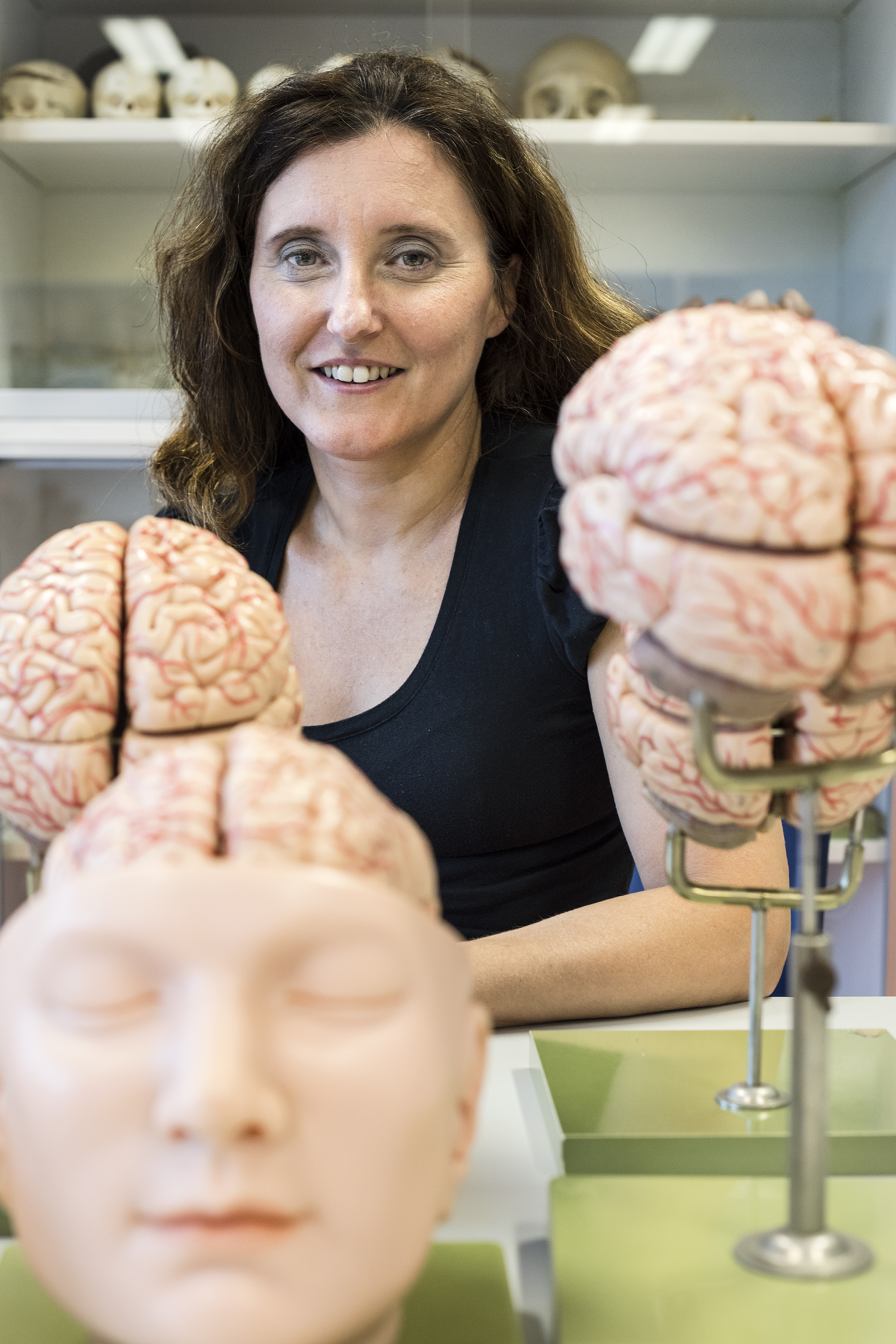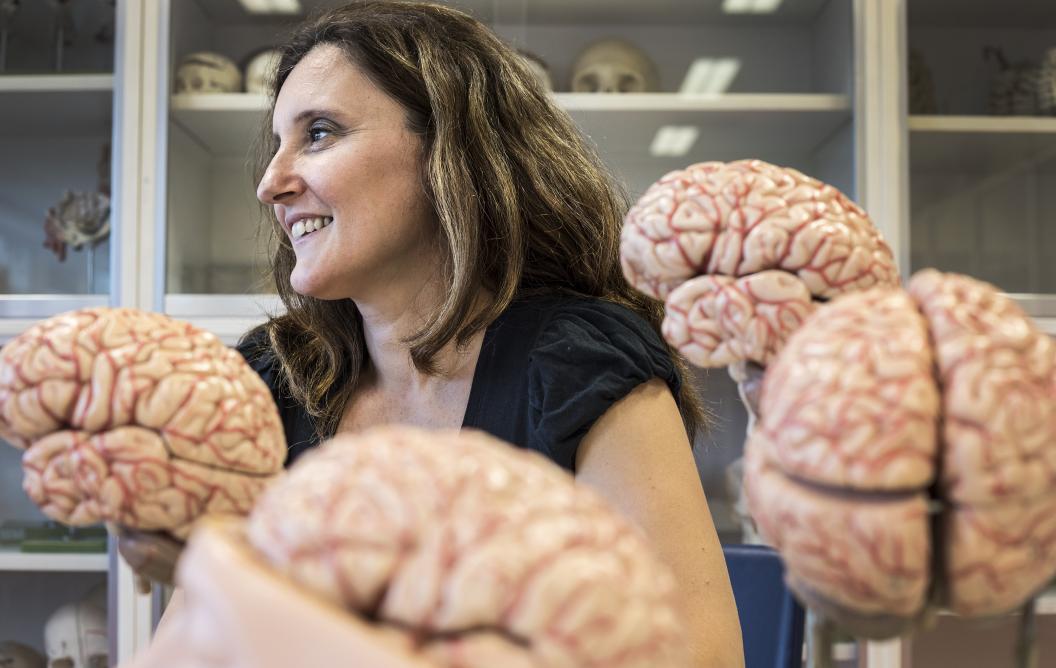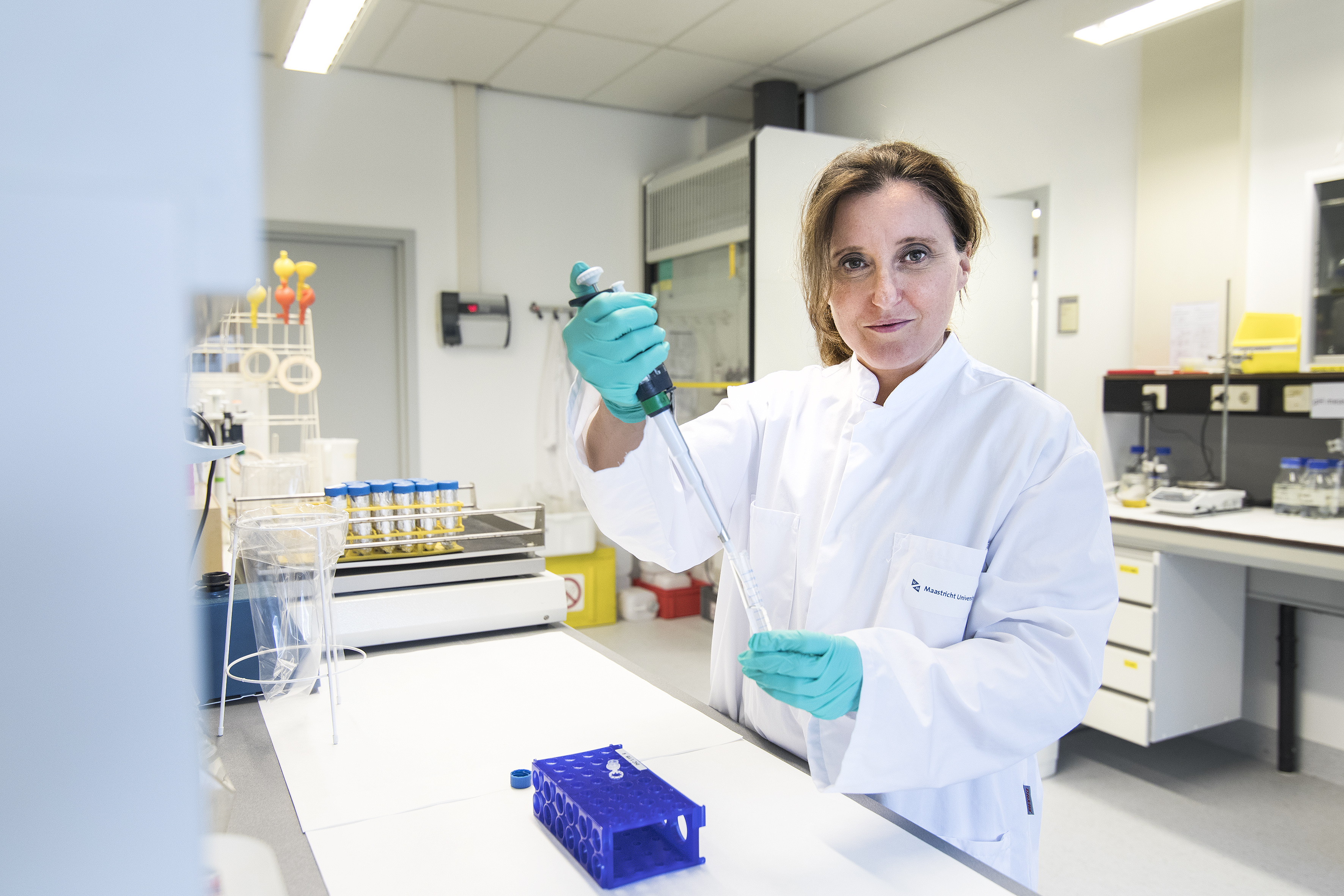Relationship between lipids and Alzheimer’s
Four years ago, Pilar Martinez began studying the role of lipids – fats – in the brains of patients with Alzheimer’s disease. She quickly became convinced that lipids play an important role in the development of this brain disease. To keep pursuing this line of research, more funding is urgently needed.
This autumn Martinez, originally from Spain, will give her inaugural lecture as a Maastricht University professor. It’s a milestone in her career, but she has other things on her mind. “I’m a bit worried,” she says in her office on the Universiteitssingel. “In 2014 we received a grant of €1.4 million from ZonMW for our research on the influence of lipids on the onset of Alzheimer’s. Enough for four years. Slowly but steadily we’re starting to believe that a fundamentally new understanding of the role of lipids is at our fingertips. We know where to look, we feel like we can now delve beneath the tip of the iceberg to gain insight into the development of degenerative brain diseases like Alzheimer’s, Parkinson’s and multiple sclerosis. And yet it’s entirely up in the air whether we’ll have the money to continue with a new project. So I’ll be honest: we need financial support.”
Key
Research funds are scarce and the competition is fierce; on average, only one in five grant applications is successful. “A lot of research is being done on brain diseases, but the translation of results into new medications has been disappointing. Large pharmaceutical companies have stopped looking for new drugs for Alzheimer’s. In Maastricht, we were one of the first universities to start studying lipids: fats that are present in every cell of the human body, especially in brain cells. American scientists have discovered an abnormality in a certain class of lipids, called sphingolipids, in female Alzheimer’s patients. We’re not currently looking at the causes, but investigating whether drugs can alter the composition of these lipids. If so, we may hold the key to a new treatment principle.”
Beginning
Martinez is frank about it: there’s still a long way to go. “We’re only at the beginning. We’re studying in vitro, in labs, and experimenting on mice. These processes are very complex and complicated. There are so many different lipids and every one of them affects the cell membrane. But we do know that manipulating these lipids changes the cells. It may even heal cells that are sick or dying, as is the case in Alzheimer’s. We also see an effect on inflammation, and therefore on the onset of cancer and vascular disease. We need to keep pursuing this.”
EURLIPIDS
Martinez’s plea finds strong support in academic circles – especially at EURLIPIDS, a virtual platform for collaboration between UM, the University of Liège, KU Leuven, RWTH Aachen University, the University of Hasselt, the Maastricht Multimodal Molecular Imaging Institute (M4I) and DSM. Established with the support of Interreg Europe, the platform focuses exclusively on lipids. “It’s unique”, says Martinez, who was involved in establishing EURLIPIDS on behalf of the Maastricht University Medical Centre+ and now provides input through her own research. “There’s so much expertise and equipment within a 40 kilometre radius. Each of the universities involved has its own specialty and research equipment. By combining these, researchers gain access to all kinds of technology. This is important because lipids can be studied in different ways.”

Pilar Martinez (1972), a molecular biologist, received her PhD degree cum laude from the University of Valencia. She has worked at the Maastricht UMC+ since 2002 as a researcher, assistant professor and, since October 2017, professor Neuro-inflammation and Neuropsychiatric Disorders. In 2016 she was the first UM researcher to receive a grant from the Canadian Weston Brain Institute for her research on Alzheimer’s disease.
Martinez will deliver her inaugural lecture ‘Lipids and antibodies in neurological and psychiatric diseases’ on Friday 5 October. The lecture will be preceded by the mini-symposium ‘About lipids and antibodies in brain and nervous system disorders’ at Centre Ceramique (Plein 1992, Maastricht), with lectures on neurodegenerative and neuro-inflammatory disorders such as myasthenia gravis, Alzheimer’s and encephalitis. Register here

Spectrometry

One of those ways is mass spectrometry. “Here in Maastricht we use the latest scanners and imaging techniques to map changes in lipids, right down to the molecular level. We can see the effects of substances, which brings us closer to a full understanding of these lipids. This is ideal for my research because we want to know what lipids do in cells. I’m a biologist, though, not a technician. Fortunately, these disciplines come together in EURLIPIDS.”
Crucial
Just before the summer, a technical partner of EURLIPIDS published an article in the journal Nature Methods on one of their first successes: a tool that can be used to quickly determine the stage and severity of a disease such as Alzheimer’s or MS based on lipid levels. “A great result, and a tool we’ll be using too,” says Martinez. “It’s made it even clearer that lipids are crucial to the health of cells in the human body. To be continued – that much is certain.”
Also read
-

Frederik Claasen, the head of policy at our partner organisation Solidaridad Network on the opportunities and obstacles facing smallholder farmers in their data ecosystems.
-
The PhD research of Karlien Strijbosch focuses on Senegalese migrants who were forced to return home after a stay in Europe. Doing justice to such stories is no easy feat, especially when you come up against walls of silence, distrust and shame. Strijbosch and her supervisor Valentina Mazzucato...
-
After several rocky years, Maastricht University alum Lea Vink has found her feet in Vienna. Professionally, she is taking new steps at the crossroads of aviation and organisational psychology. And on a personal level, luck has smiled on her since her transition from man to woman.
- in Corporate
- in Featured
- in Human interest

